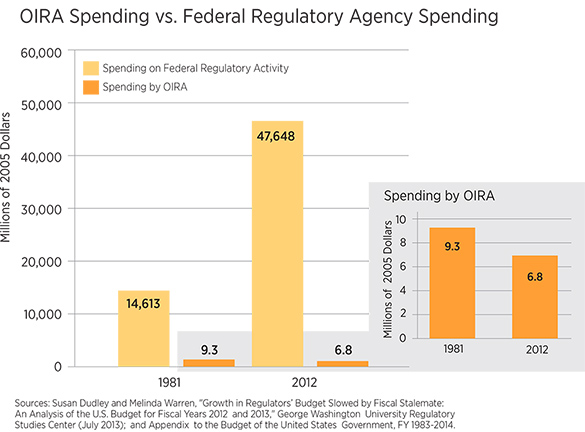- | Regulation Regulation
- | Data Visualizations Data Visualizations
- |
OIRA Spending Falls as Agency Spending Swells
The Office of Information and Regulatory Affairs (OIRA) was created by the 1980 Paperwork Reduction Act. Since 1981, OIRA has reviewed regulatory actions by federal agencies. OIRA review is intended to ensure that regulations meet the basic standards set forth by presidential Executive Orders governing regulatory review. These minimum standards include identifying the problem the agency is seeking to solve through regulation, considering a variety of alternatives, and assessing the benefits and costs of each alternative.
The Office of Information and Regulatory Affairs (OIRA) was created by the 1980 Paperwork Reduction Act. Since 1981, OIRA has reviewed regulatory actions by federal agencies. OIRA review is intended to ensure that regulations meet the basic standards set forth by presidential Executive Orders governing regulatory review. These minimum standards include identifying the problem the agency is seeking to solve through regulation, considering a variety of alternatives, and assessing the benefits and costs of each alternative.
A recent Mercatus Center Working Paper, “Regulatory Process, Regulatory Reform, and the Quality of Regulatory Impact Analysis” by Jerry Ellig and Rosemarie Fike, found that regulations which OIRA spent more time reviewing were accompanied by higher quality regulatory impact analysis (RIAs). They conclude, “Expansion of OIRA’s resources and role may improve the quality of RIAs.”
However, since the early 1980s, OIRA’s budget has shrunk by roughly 27 percent, adjusting for inflation, and the agency staff has halved. During the same time spending by agencies on regulatory activity has soared, increasing by more than 225 percent from 1981 to 2012. In fact, in 2012 OIRA was outspent 7,000 to 1 by federal regulatory agencies. By comparison, OIRA was only outspent around 1,500 to 1 in 1981.
While the hiring of tens of thousands of airport security officers after 9/11 accounted for part of this growth, regulatory spending increased by 183 percent since 1981, even if the Transportation Security Administration is excluded from the total.
OIRA’s limited resources make it increasingly difficult for it to ensure that other federal agencies are adhering to principles of good policy making and conducting a well-informed economic analysis before promulgating regulations. Increasing OIRA’s budget and staffing levels improve the odds that the federal regulatory system will address real problems and make Americans better off.


